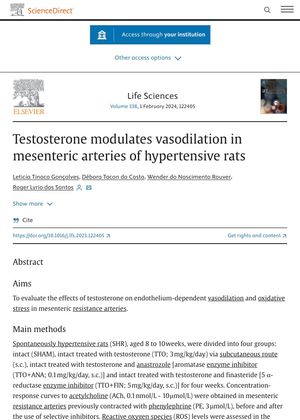TLDR Testosterone affects blood vessel relaxation in hypertensive rats.
The study investigated the effects of supraphysiological doses of testosterone on mesenteric vascular reactivity in spontaneously hypertensive rats (SHR). The main finding was that testosterone modulates the vascular environment by altering endothelial relaxation pathways, which may help maintain endothelial homeostasis even at high concentrations. The study also highlighted the essential role of 17-β-estradiol (E2) in vascular relaxation, as it modulates the action of prostanoids and nitric oxide, although dihydrotestosterone (DHT) appears to decrease nitric oxide levels. The research was conducted on 8- to 10-week-old SHRs and supported by various Brazilian research funding agencies.
 10 citations,
May 2019 in “International Journal of Environmental Research and Public Health”
10 citations,
May 2019 in “International Journal of Environmental Research and Public Health” Finasteride may cause kidney damage.
 131 citations,
September 2017 in “Molecular and Cellular Endocrinology”
131 citations,
September 2017 in “Molecular and Cellular Endocrinology” The document concludes that blocking the internal pathways that create androgens might help treat cancers that depend on sex hormones.
50 citations,
April 2010 in “Biology direct” Low androgen levels might delay prostate cancer but could lead to more aggressive, therapy-resistant cancers.
 16 citations,
December 2021 in “Frontiers in Endocrinology”
16 citations,
December 2021 in “Frontiers in Endocrinology” Sex hormones may affect COVID-19 severity, with estrogen possibly reducing risk and testosterone potentially increasing it.
 November 2023 in “Frontiers in Neuroendocrinology”
November 2023 in “Frontiers in Neuroendocrinology” Some people experience lasting sexual, psychological, and sleep problems after using finasteride or SSRI antidepressants, possibly due to similar underlying causes.
 47 citations,
August 2016 in “Fitoterapia”
47 citations,
August 2016 in “Fitoterapia” Some herbs and their components might help treat hair loss by affecting various biological pathways, but more research and regulation are needed.
October 2022 in “Biomedicines” Finasteride in male rats causes liver and metabolic issues in their offspring.





